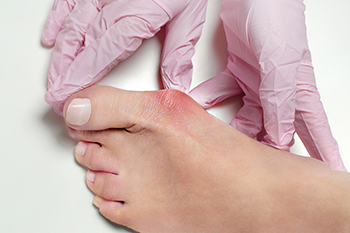Will Bunions Go Away on Their Own?
Tuesday, 27 December 2022 00:00
There is no mistaking what a bunion is. It is a common foot deformity that can develop from wearing shoes that are too tight and is noticeable by the small bony protrusion that is seen on the side of the big toe. Bunions that are left untreated may grow and push the other toes toward each other. This can present difficulty in walking and medical attention is often sought for comfort and relief. Research has shown a bunion may also be caused by genetic factors in addition to medical conditions such as various types of arthritis. People who are afflicted with a bunion may need to purchase larger shoes to accommodate it and mild relief may be found when a protective pad is worn over it. Bunions do not go away on their own and it is strongly suggested that a podiatrist be consulted who can prescribe orthotics or recommend surgery for permanent removal.
If you are suffering from bunion pain, contact one of our podiatrists of Coastal Foot & Ankle Wellness Center, LLC. Our doctors can provide the care you need to keep you pain-free and on your feet.
What Is a Bunion?
Bunions are painful bony bumps that usually develop on the inside of the foot at the joint of the big toe. As the deformity increases over time, it may become painful to walk and wear shoes. Women are more likely to exacerbate existing bunions since they often wear tight, narrow shoes that shift their toes together. Bunion pain can be relieved by wearing wider shoes with enough room for the toes.
Causes
- Genetics – some people inherit feet that are more prone to bunion development
- Inflammatory Conditions - rheumatoid arthritis and polio may cause bunion development
Symptoms
- Redness and inflammation
- Pain and tenderness
- Callus or corns on the bump
- Restricted motion in the big toe
In order to diagnose your bunion, your podiatrist may ask about your medical history, symptoms, and general health. Your doctor might also order an x-ray to take a closer look at your feet. Nonsurgical treatment options include orthotics, padding, icing, changes in footwear, and medication. If nonsurgical treatments don’t alleviate your bunion pain, surgery may be necessary.
If you have any questions, please feel free to contact one of our offices located in St. Augustine, and Palatka, FL . We offer the newest diagnostic and treatment technologies for all your foot care needs.







